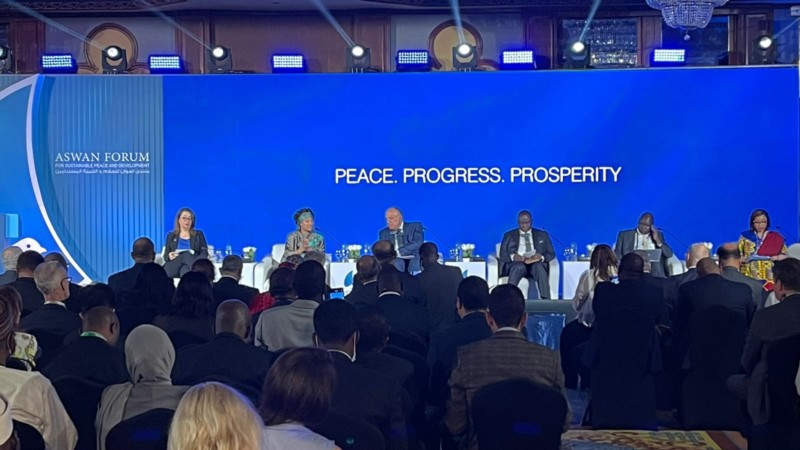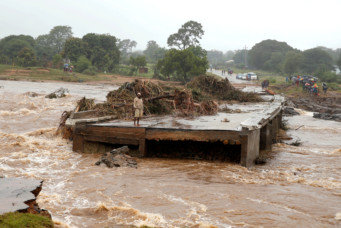From Borno to Aswan: Where Development, Climate and Conflict are Interlinked
The Aswan Forum, hosted on June 21-22 in Cairo, discussed topics related to African peace and development, including climate change, confronting terrorism, regional security, youth and women empowerment, and more.

FM #Sameh_Shoukry hosts the 1st session of the @AswanForum which adresses the challenges facing the African continent & means of confronting them, with the participation of a number of African Ministers & High Level officials from the AU & the UN. Egypt MFA Spokesperson/Twitter
The Aswan Forum, whose third edition concluded on June 22, is a high-level, multi-stakeholder platform that brings together African and global government officials, thinkers, youth, and policy experts in international inter-governmental and non-governmental organizations, to discuss issues of peace and development. This year’s edition, hosted by the Cairo International Center for Peacekeeping, Peacebuilding, and Conflict Resolution (CCCPA), was held under the theme “Africa in an era of cascading risks and climate vulnerability: pathways for a peaceful, resilient, and sustainable continent.” The Cairo Review’s Omar Auf attended and covered the conference.
Climate Vulnerability
In his opening remarks, Egyptian Foreign Minister Sameh Shoukry noted the need for engaging in meaningful conversations regarding the challenges which threaten the security and wellbeing of the African continent. He emphasized the importance of diversifying food sources, clamping down on the pandemic, adopting a comprehensive approach to combatting terrorism, and tackling climate change issues. On the latter, Shoukry said that “we must strive for specific outcomes during the Conference of the Parties (COP) that benefit Africa,” and that finance in the area of climate adaptation is important, especially considering the fact that Africa is the continent least responsible for climate change. Egyptian President Abdelfattah Al-Sisi echoed similar sentiments in a recorded message, noting that countries must be diligent in their commitment to implement international pledges regarding Africa, especially in the area of climate adaptation. Sisi also stressed the importance of enhancing women’s roles in the state and international community.
United Nations Secretary-General Antonio Guterres followed in another recorded message, describing the current crises as “unprecedented and multidimensional,” mentioning economic strains, the Russian invasion of Ukraine, vaccine inequality, and the climate crisis, which he noted Africa is “paying an outsized price” for. Guterres said that we must expand African countries’ access to finance and debt relief, as well as strengthen governments, institutions, and justice systems. He added that the global community needs to accelerate the transition from coal to renewables.
Some, such as Moussa Faki Mahamat, stressed that Africa must be supported in capacity building to be able to switch to low carbon energy sources. The Chairperson of the African Union Commission recognized climate change as a “significant obstacle to the realization of the Africa we want,” as well as a threat multiplier that creates food insecurity, accentuates poverty, and exacerbates terrorism and extremism.
UN Climate Change High-Level Champion at COP27 and UN Special Envoy on Financing for the 2030 Agenda for Sustainable Development Mahmoud Mohieldin said that 1 percent of GDP should be spent on dealing with climate adaptation, with a financial sector “fully aligned with climate action”, adding that the pledged 100 billion dollars a year by developed countries for climate finance is merely “a drop in the ocean” in a world of trillions of dollars. Selwin Hart, United Nations Special Advisor and Assistant Secretary General for Climate Action, agreed with this evaluation, in a session on looking ahead to COP27, stating that despite the cost of renewables decreasing, we need at least four trillion dollars a year in new investments in the renewable energy grid to give us a fighting chance to maintain a temperature increase of less than 1.5 degrees Celsius compared to pre-industrial levels.
Yet, women and the poor are crowded out of climate financing, according to Kevin Urama, Chief Economist and Vice President for Economic Governance and Knowledge Management of the African Development Bank. Nor is funding going to the countries who need it the most. He added that funding for the poorest countries must increase to fulfill their basic development needs, which is in the hundreds of billions for one year. Urama believes there must be a reallocation of special drawing rights from countries who do not need it to those who do.
The cascading climate-induced risks are far-reaching and varied. For example, U.S. Deputy Special Envoy for Climate Susan Biniaz established a correlation between climate change and conflict, mentioning the need to strengthen early warning systems, as a third of the global population as well as half of the African population do not have access to early warning programs. South Sudan’s Minister of Peacebuilding, Stephen Par Kuol, affirmed the link between climate change and conflict, addressing displacement due to floods, which can be abrupt and destructive and forces people to migrate to other areas.
Cascading Risks in Africa
Africa is particularly impacted by the emerging global food and energy crisis as it is still struggling to recover from the impacts of the pandemic. Shoukry added that the continent should further seize the opportunity to enhance its ability to absorb crises, and that the mutual nature of increasingly global challenges cannot be isolated to one area alone, and must have to be dealt with by the entirety of the international community.
Senegalese Foreign Minister, Aïssata Tall Sall, whose country currently chairs the African Union, criticized the lack of financing going toward the continent’s development, adding that development “must be fair before it can be sustainable.” She also added terrorism and violent extremism to the list of challenges facing all continents. She cites Libya as an example, saying that “we naively thought that the terrorism in Libya would stop at the Libyan borders.” However, it spread to other countries.
Agreeing with this message, Ghada Wali, Director General of the United Nations Office on Drugs and Crime, stated that Africa remains the continent most affected by terrorism, with 48 percent of all deaths globally attributed to terrorism coming from Sub-Saharan Africa. Wali emphasized the need to further strengthen prevention and resilience through whole-of-society action and integrated responses. She also addressed the need to empower women and girls to contribute to solutions.
Persistent and divisive conflicts, alongside climate-induced risk, were identified by South Sudan’s Kuol as an example of a cascading risk, stating that such conflicts are “threatening the very foundation of statehood and existing.” He said that South Sudan is simultaneously dealing with conflict, state-building, and nation-building in a volatile environment. To this end, the Ministry of Peacebuilding was established to promote dialogue among political parties, stakeholders, and communities, and to strive for the reunification of long-quarreling forces. Furthermore, Kuol advised the African Union to adopt a new policy of preventive diplomacy by deploying robust diplomatic missions everywhere to provide technical support, saying that the African Union (AU) “should aim at addressing structural drivers of armed conflict”.
Women as Catalysts for Resilience
In a session titled “Leveraging Women’s Role as Catalysts for Resilience Towards Sustainable Peace and Development in Africa,” the role of women in disarmament, demobilization, reintegration (DDR), sustainable development, peacekeeping, and peacebuilding was discussed. To Basil Jones, the African Development Bank’s Lead Program and Policy Coordinator on Gender, Women and Civil Society, “supporting women is smart economics,” and we must ensure that women don’t get left behind in project design and implementation.
On the issue of peacekeeping, Community of Central African States’ Commissioner for the Promotion of Gender, Human, and Social Development, Kapinga Yvette Ngandu, referenced Security Council Resolution 1325, which recognized “the urgent need to mainstream a gender perspective in peacekeeping operations,” and urged member states and the Secretary-General to increase women’s participation in peace processes and take into account women’s and girls’ needs and how they are affected during conflict. Ngandu states that since the adoption of the resolution, a lot of member states have adhered to the women peace and security agenda, yet many statistics show that women participation in negotiation processes is still low.
Yet, there are specific areas in which women are disproportionately affected: climate change and conflict are two of those areas. Sweden’s Special Envoy for Religion in Conflict and Peacebuilding Peter Weiderud noted that “the effects of climate change are not gender-equal,” with women likely to struggle the most with increasing climate change effects. On the other hand, Zuwaira Gambo, Nigeria’s State of Borno’s Commissioner for Women Affairs and Social Development, stated that the majority of the victims of insurgents in Nigeria are women and children, with women, boys, and girls abducted or conscripted, and women forced into marriage. She added that it was not just about the role of women in conflicts and conflict-resolution that needed close attention, but rather sharing experiences of the survivors. Gambo stresses the importance of strengthening the resilience of populations affected by violence, adding that women are critical stakeholders in DDR.
Aswan in Practice
Borno State in Nigeria, which is considered the center of the Boko Haram insurgency, made an important contribution to the Aswan Forum this year. What makes the Governor of Borno’s participation in the conference particularly special is the CCCPA team’s visit to Nigeria and the subsequent report which was presented during the session on advancing holistic efforts to confront Africa’s terrorism challenge. This came from a desire to operationalize the conclusions of the Aswan Forum and put it into practice on-ground, through capacity-building, convening and research, and feeding back the results to better inform the Forum’s deliberations, as part of the ‘Aswan Forum Cycle’.
In the session, Governor of Borno Babagana Zulum explained how his state was confronted with mass defections following the Boko Haram leader’s death in May 2021. Following that, it was necessary to address the root causes of terrorism and insurgency, such as poverty and the fragility of the state. Zulum affirmed the necessity of understanding how to provide support to victims while dealing with the mass waves of defectors, and added that the state needs the support of the international community to be able to resolve the conflict.
According to the report, even before the Boko Haram leader’s death, Borno played a pivotal role in the national rehabilitation program for former combatants, Operation Safe Corridor (OPSC), established in 2016. The program aims to reintegrate ex-combatants into society through a camp which provides vocational training and psychological support. The camp graduated over 1500 former militants back into society.
After graduation, Borno helps with tracing graduates to their families, facilitating family visits, and providing a final transit center before reintegration. Borno also hosts the Bulumkutu Rehabilitation Center for women and children, which is important as OPSC is a male-only program.
After May 2021, however, the number of defectors increased dramatically, according to the Borno state government, which puts the number since August 2021 at almost 59,000. To keep up, Borno devised an identification process involving differentiating “farmers” (those not directly affiliated with Boko Haram or ISWAP and are allowed an expedited reintegration process) from former fighters and their families. The state also enlarged the transit center and women and children’s camp, as well as repurposed a camp used for the Muslim pilgrimage, to accommodate mass defections. These camps provide religious teachings and vocational training as part of the rehabilitation process. Over 48,000 have been reintegrated so far. However, the state needs more support from the international community to be able to support defectors, according to both the report and Governor Zulim.
The report describes the Borno state model as “at its core, a localized approach that emerged to meet unprecedented and rapidly evolving dynamics and terrain.” It emphasizes the importance of viewing the state and federal approaches not as separate, but as a hybrid model which reorients the relationship between state and federal levels to become more interconnected, and as a result more efficient.
Other Sessions
Other sessions in the forum included ones on culture, the Red Sea, the Sahel, regional security arrangements, finance, youth empowerment, and AU-UN partnerships. On the last, William Azumah Kanyirege-Awinador, Senior Advisor of the African Union on Governance and Peacebuilding, described the cooperation between the UN and Africa as complex and multifaceted, and there is always room to make it more effective by more greatly harnessing synergies and complementarities. On the other hand, Osama Abdelkhalek, Egypt’s Permanent Representative to the UN, emphasized that to ensure establishing African solutions to African problems, there is still a need for strengthening African capacities to advance such solutions.
In the youth empowerment session, Cynthia Chigwenya, the African Youth Ambassador for Peace from South Africa, said that young people must take ownership of the continental peace and security framework, while Merna Ahmed, a Climate Practitioner at UNFPA, mentioned the importance of youth engagement in program design and implementation, as well as the importance of mainstreaming climate change in all projects.
Furthermore, in the session on financing sustainable peace and development, the Assistant UN Secretary-General for Peacebuilding Support, Elizabeth Spehar, pointed out that peacebuilding’s share from overall development finance is low, adding that only three donors make up more than half of financial contributions to peacebuilding. This is despite member states recognizing the need for more sustainable, predictable resources for peace, as “the rhetoric is there. We need to make sure the resources are also there.” Spehar advised that we need more non-traditional donors to step up, as well as more work on innovative financing for peacebuilding. She warned that the private sector exists to make money, so we must be cognizant of the extent of its contribution.
What’s Next?
With the forum at a close, we can look forward to the Aswan Conclusions, summarizing some of the outcomes of the forum. Then we enter the Aswan Cycle, where capacity-building projects, preparatory workshops, and on-ground reporting take place. We can also look forward to COP27, taking place in Sharm El-Sheikh, Egypt next November. There, the relationship between climate change and conflict, much discussed during the Aswan Forum, must be utilized to make the case for increased climate financing and concrete action.
Another important pursuit will be to increase financing for peacebuilding in particular, in order to tackle the root causes of conflict. Financing in general is a complicated issue that involves donors, stipulations, and, sometimes, differing visions. Successful peacebuilding would reduce the need for peacekeeping, so financing peacebuilding would bear a twofold benefit of strengthening one and reducing the need for the other.
Onlookers may wonder, however, how conducive the international environment is when it comes to cooperating for peace, climate, and development, especially when considering the Russian invasion of Ukraine is still ongoing, the rising far-right nationalist sentiments of the past few years, and subsequent increased isolationism in an ever so connected world. Yet the Aswan Forum, and other organizations’ activities, including the AU and UN, may serve as a reminder that for some, the pursuit of peace never stops. Rather, it must be intensified in these trying times.
Omar Auf is deputy senior editor at the Cairo Review of Global Affairs. He has previously worked and published in independent media organization Mada Masr and as an assistant editor at the Cairo Review.
Auf holds a Master of Global Affairs degree with a regional and international security concentration from the American University in Cairo, and a Bachelor of Arts in economics from Sciences Po Paris.
Read More




